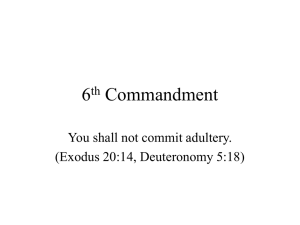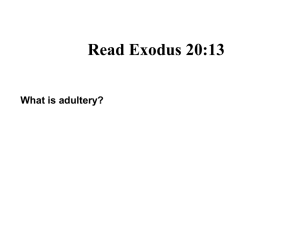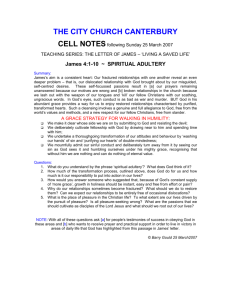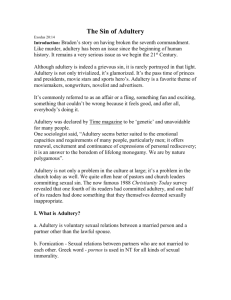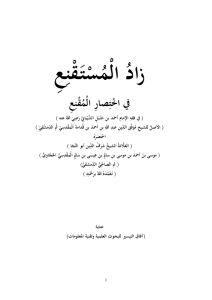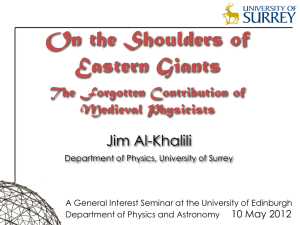Your Share of Adultery - Authentic
advertisement
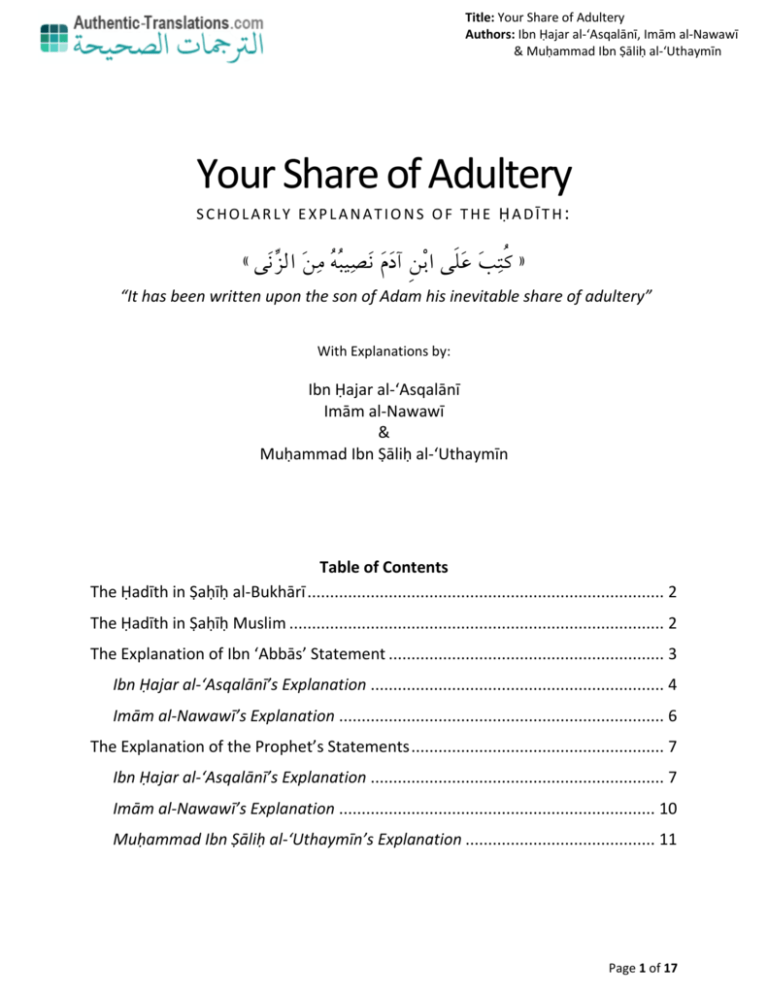
Title: Your Share of Adultery Authors: Ibn Ḥajar al-‘Asqalānī, Imām al-Nawawī & Muḥammad Ibn Ṣāliḥ al-‘Uthaymīn Your Share of Adultery SCHOLARLY EXPLANATIONS OF THE ḤADĪTH: » الزنَى ِّ َ« كُتِبَ عَلَى ابْنِ آدَمَ نَصِيُبهُ مِن “It has been written upon the son of Adam his inevitable share of adultery” With Explanations by: Ibn Ḥajar al-‘Asqalānī Imām al-Nawawī & Muḥammad Ibn Ṣāliḥ al-‘Uthaymīn Table of Contents The Ḥadīth in Ṣaḥīḥ al-Bukhārī ............................................................................... 2 The Ḥadīth in Ṣaḥīḥ Muslim ................................................................................... 2 The Explanation of Ibn ‘Abbās’ Statement ............................................................. 3 Ibn Ḥajar al-‘Asqalānī’s Explanation ................................................................. 4 Imām al-Nawawī’s Explanation ........................................................................ 6 The Explanation of the Prophet’s Statements ........................................................ 7 Ibn Ḥajar al-‘Asqalānī’s Explanation ................................................................. 7 Imām al-Nawawī’s Explanation ...................................................................... 10 Muḥammad Ibn Ṣāliḥ al-‘Uthaymīn’s Explanation .......................................... 11 Page 1 of 17 Title: Your Share of Adultery Authors: Ibn Ḥajar al-‘Asqalānī, Imām al-Nawawī & Muḥammad Ibn Ṣāliḥ al-‘Uthaymīn The Ḥadīth in Ṣaḥīḥ al-Bukhārī Ibn ‘Abbās ( ) رضي اهلل عنهماsaid: I have not seen anything more resembling of the minor sins than what Abū Hurayrah reported from the prophet ( ) صلّى اهلل عليه وسلّم: فَ ِزنَا، َ َأدْرَكَ ذَلِكَ َال مَحَالَة، « ِإنََّ اللََّهَ كَتَبَ عَلَى ابْنِ آدَمَ حَ َّظَهُ مِنَ ال َّزِنَا ُ وَالْفَرْج، وَالنََّفْسُ تَمَنََّى َوتَشَْتهِي، ُ وَ ِزنَا اللَِّسَانِ الْمَنْطِق، ُالْعَيْنِ النََّظَر » ُك َّذُِبه َ ُ وَي، ك َ ص َّدِقُ ذَ ِل َ ُي Allah has written for the Son of Adam his (inevitable) share of adultery which he will indulge in; there is no escape from it. The adultery of the eye is the look and the adultery of the tongue is what is uttered. The inner soul hopes and desires (adultery) and the private parts either confirm that (turn it into reality) or deny it (refrain from submitting to the temptation). The Ḥadīth in Ṣaḥīḥ Muslim Ibn ‘Abbās ( ) رضي اهلل عنهماsaid: I have not seen anything more resembling of the minor sins than what Abū Hurayrah said that the prophet ( ) صلّى اهلل عليه وسلّمsaid: فَزِنَى، َالزنَى َأدْ َركَ ذَ ِلكَ َال مَحَا َلة ِّ ََظهُ مِن َّ اللهَ كَتَبَ عَلَى ابْنِ آدَمَ ح َّ َّ« إِن ُ وَالْفَ ْرج، وَالنَّفْسُ تَمَنَّى َوتَشَْتهِي، ُ وَزِنَى اللِّسَانِ النُّطْق، ُالْعَيْنَيْنِ النَّظَر » َُذُبه ِّ َدقُ ذَ ِلكَ أَوْ يُك ِّ يُص Page 2 of 17 Title: Your Share of Adultery Authors: Ibn Ḥajar al-‘Asqalānī, Imām al-Nawawī & Muḥammad Ibn Ṣāliḥ al-‘Uthaymīn Allah has written for the Son of Adam his inevitable portion of adultery which he will indulge in; there is no escape from it. The adultery of the two eyes is the look and the adultery of the tongue is the utterance. The inner soul hopes and desires (adultery) and the private parts either confirm that or deny it. In a similar narration recorded by Imām Muslim, Abū Hurayrah ( ) رضي اهلل عنه narrated that the prophet ( ) صلّى اهلل عليه وسلّمsaid: ِ فَالْعَيْنَان، َالزنَى ُمدْرِكٌ ذَ ِلكَ َال مَحَا َلة ِّ َ« كُتِبَ عَلَى ابْنِ آدَمَ نَصِيبُهُ مِن ُ وَالَْيد، ُ وَاللِّسَانُ ِزنَاهُ الْكَالَم، ُ وَاألُُذنَانِ ِزنَاهُمَا االِسْتِمَاع، ُِزنَاهُمَا النَّظَر َُدق ِّ وَيُص، وَالْقَلْبُ َيهْوَى وَيَتَمَنَّى، جلُ ِزنَاهَا الْخُطَا ْ َالر ِّ و، ُِزنَاهَا الْبَطْش » َُذُبه ِّ ذَ ِلكَ الْفَرْجُ وَيُك It has been written upon the Son of Adam his share of adultery which he will indulge in; there is no escape from it. The two eyes, their adultery is looking (at what is forbidden). The two ears, their adultery is listening. The tongue, its adultery is speaking. The hand, its adultery is touching, and the foot, its adultery is walking (toward adultery). The heart desires and hopes (for adultery) but the private parts either confirm that or deny it. The Explanation of Ibn ‘Abbās’ Statement Page 3 of 17 Title: Your Share of Adultery Authors: Ibn Ḥajar al-‘Asqalānī, Imām al-Nawawī & Muḥammad Ibn Ṣāliḥ al-‘Uthaymīn Ibn Ḥajar al-‘Asqalānī’s Explanation: 1 The Arabic word ِ اللََّمَمal-lamam (“minor sins”) in Ibn ‘Abbās’ statement, “I have not seen anything more resembling of the minor sins than what Abū Hurayrah reported,” is anything a person may be blamed for of his inner desires. It has also been said that the word means the actual perpetration of minor sins and thus alRāghib said, “It is the perpetration of a sin,” when he was discussing minor sins. Ibn ‘Abbās’ was likely specifying that what is mentioned in the ḥadīth (i.e., the adultery of the sight and speech) are types of minor sins or they carry the same ruling as minor sins. al-Khaṭṭābī said that “minor sins” in Ibn ‘Abbās’ statement is the same as Allah ( ) تعاىلmentions in His statement: ذ ْ ْ ْ ذ ذ ْ ُ .َّلَاللمم َ ِ حشََإ ِ اْلث َِمَوالفوا ِ ََ اَّلِينَََيتنِبونََكبائِر Those who avoid the major sins and indecent, shameful deeds, except for minor sins (ِ ال َّلَمَمal-lamam).2 This means those minor sins will be pardoned (if the preceding condition is met). And He said in another verse: ُ ْ ْ ُْ ُ ُ إِنََتتن ِ ُبواَكبائِرََماَتنه ْونََعن َُهَنكفِ َْرَعنك َْمَسيِئات ِك َْم 1 The translated selections from Ibn Ḥajar al-‘Asqalānī is from his book Fatḥ al-Bārī Sharḥ Ṣaḥīḥ al-Bukhārī with some detailed notes about the chain of narrators omitted. 2 The Quran, Sūrah al-Najm (53:32). Page 4 of 17 Title: Your Share of Adultery Authors: Ibn Ḥajar al-‘Asqalānī, Imām al-Nawawī & Muḥammad Ibn Ṣāliḥ al-‘Uthaymīn If you avoid the major sins which you have been forbidden, We will expiate for you your (minor) sins.3 From these two verses, it is deduced that this word ِ ال َّلَمَمal-lamam is used to describe types of minor sins, and as such, they will be expiated if major sins are avoided. And the explanation of this has preceded when discussing the ḥadīth, “Whoever intends to perform a good deed…and whoever intends to perform a bad deed” in an earlier chapter. Ibn Baṭṭāl said, “Allah has favored His worshippers with forgiveness for these minor sins as long as their private parts do not confirm the act of adultery for them. If it does confirm adultery, then that becomes a major sin.” ذ al-Farā reported that some people claimed the word ّل َ ِ “( إexcept”) in the verse .Those who avoid the major sins and indecent, shameful deeds, except for minor sins actually means “and” (i.e., including minor sins) but he refuted this claim saying, “[It means] except for minor sins as those will be expiated by avoiding major sins.” These minor sins (of the eyes and tongue in the ḥadīth) are described as being adultery and fornication only because they are means which invite and tempt one to commit adultery. Thus, it is by way of figuratively describing the means leading to an action with the action itself. 3 Sūrah al-Nisā (4:31). Page 5 of 17 Title: Your Share of Adultery Authors: Ibn Ḥajar al-‘Asqalānī, Imām al-Nawawī & Muḥammad Ibn Ṣāliḥ al-‘Uthaymīn Imām al-Nawawī’s Explanation: 4 As for the statement of Ibn ‘Abbās, “I have not seen anything more resembling of the minor sins than what Abū Hurayrah reported,” the meaning is that it explains the verse in which Allah ( ) تعاىلsays: ذ ْ ْ ْ ذ ذ ذ ْ ُ َُنَر ذبكََوا ِس َع َ ِ ّلَاللممَََۚإ َ ِ حشََإ ِ اْلث َِمَوالفوا ِ ََ اَّلِينَََيتنِبونََكبائِر ْ ْ .ِ المغفِرَة Those who avoid the major sins and indecent, shameful deeds, only falling into minor sins, then surely your Lord is of extensive forgiveness.5 The meaning of the verse, and Allah knows best, is that those who stay away from sins other than minor ones will be pardoned. And these minor sins are also the same as in His ( ) تعاىلstatement: ُ ْ ْ ُْ ُ ُ إِنََتتن ِ ُبواَكبائِرََماَتنه ْونََعن َُهَنكفِ َْرَعنك َْمَسيِئات ِك َْم If you avoid the major sins which you have been forbidden, We will expiate for you your (minor) sins.6 The verses together mean that if you avoid major sins, only falling into minor offenses (then the minor sins will be forgiven). These are the “minor sins” meant by Ibn ‘Abbās, and his statement also explains that some minor sins are 4 Imām al-Nawawī’s notes are from his book known as Sharḥ al-Nawawī ‘alá Muslim. Sūrah al-Najm (53:32). 6 Sūrah al-Nisā (4:31). 5 Page 6 of 17 Title: Your Share of Adultery Authors: Ibn Ḥajar al-‘Asqalānī, Imām al-Nawawī & Muḥammad Ibn Ṣāliḥ al-‘Uthaymīn mentioned in this ḥadīth: looking at something forbidden, touching someone forbidden, and similar things. It is just as he says, and this is the correct understanding of “minor sins” within his statement. However, “minor sins” have also been explained as being something one may be blamed for without having actually done the action. It has also been said to mean the tendency or inclination to commit a sin yet one that is not persisted upon it. The word used by Ibn ‘Abbās has been explained in other inexplicit ways as well. Linguistically, it means the tendency to do something, seeking it out but without persisting on carrying it out, and Allah knows best. The Explanation of the Prophet’s Statements Ibn Ḥajar al-‘Asqalānī’s Explanation: 7 Imām al-Bukhārī’s sub-chapter title “Adultery of the Limbs Despite the Private Part” indicates that adultery and fornication is not exclusively restricted to one’s private parts. Rather, the term can be applied to the senses such as someone’s sight and other perceptions. This also shows the wisdom of the forbiddance to look into someone’s house without permission and shows how this ḥadīth is related to the ones before it (that discuss the prohibition to look into a person’s house without permission). 7 From Fatḥ al-Bārī Sharḥ Ṣaḥīḥ al-Bukhārī. Page 7 of 17 Title: Your Share of Adultery Authors: Ibn Ḥajar al-‘Asqalānī, Imām al-Nawawī & Muḥammad Ibn Ṣāliḥ al-‘Uthaymīn Ibn Baṭṭāl said that a person’s sight and speech have been labeled “adultery” because they both may invite someone to it, leading them to commit the actual act of adultery or fornication, and that is why he ( ) صلّى اهلل عليه وسلّمsaid at the end, » the private parts either confirm all of that or deny it. « The statement of the prophet ( ) صلّى اهلل عليه وسلّم, » Allah has written for the Son of Adam « means that Allah predestined it upon each person or He instructed the angel to write it down as has been explained for the previous ḥadīth of Ibn Masʻūd.8 Regarding » his share of adultery «, adultery or fornication is used figuratively here to describe touching, seeing, and other senses because those faculties precede (the literal, actual sin of adultery). His ( ) صلّى اهلل عليه وسلّمstatement, » which he will indulge in; there is no escape from it « means that each individual will certainly indulge in the deeds that have been decreed for him to do. And with this understanding, it becomes clear why this ḥadīth accurately fits in this chapter (al-Bukhārī records it in the chapter titled “The Book of Destiny”). 8 The ḥadīth of Ibn Masʻūd that Ibn Ḥajar is referring to contains the following statement of the prophet ( ) صلّى اهلل عليه وسلّمabout the creation of people while in their mothers’ wombs: » ٌ وَشَقِيٌّ أَوْ سَعِيد، ُ وَ ِرزْ ُقه، ُ وََأجَ ُله، ُ فَيُكْتَبُ عَمَ ُله: ٍاللهُ ِإلَْيهِ مَلَكًا ِبَأرْبَعِ كَ ِلمَات َّ ُ« ثُمَّ يَبْعَث …then Allah sends an angel to write four items: he writes his deeds, the time of his death, the means of his livelihood, and whether he will be wretched or blessed. Page 8 of 17 Title: Your Share of Adultery Authors: Ibn Ḥajar al-‘Asqalānī, Imām al-Nawawī & Muḥammad Ibn Ṣāliḥ al-‘Uthaymīn Ibn Baṭṭāl says that anything Allah has written to happen to a human being has already been known to Allah and there is no way for a person to escape what was written and decreed for him. No one is able to prevent his destiny unless he censures himself when he falls into anything he has been forbidden to do thus blocking it. Each individual has also been empowered to adhere to the obedience of Allah. This understanding refutes the claims of those who believe in unrestricted, total freewill (e.g., the Qadariyyah sect) and those who believe in total fatalism with no freewill at all (e.g., the Mujbirah sect). In support of this is also the statement in the ḥadīth, » The inner soul hopes and desires (adultery) « because someone who desires to commit a sin is not like someone who actually commits it. » The adultery of the eye is the look « means looking at anything that is not permitted for the looker to see and » the adultery of the tongue is what is uttered « in another narration uses the Arabic word for His ( ) صلّى اهلل عليه وسلّمstatement, “utterance.” His ( ) صلّى اهلل عليه وسلّمstatement, » the private parts either confirm all of that or deny it « shows that a person’s private part confirms (the adultery of the senses previously mentioned) by actualizing them, turning them into reality based on the perceptions the senses perceive (or speak). Or the private part may deny them (their temptations to commit adultery) which is the very opposite of the confirmation just explained. So the private part is the location and actual means (of adultery) by way of analogy—the private part is used here synonymously as Page 9 of 17 Title: Your Share of Adultery Authors: Ibn Ḥajar al-‘Asqalānī, Imām al-Nawawī & Muḥammad Ibn Ṣāliḥ al-‘Uthaymīn either the perpetrator or preventer of adultery—and is considered the determining factor which may necessitate the prescribed ruling of punishment. In his ( ) صلّى اهلل عليه وسلّمstatement, » The inner soul hopes and desires (adultery).« is also proof that a person does not have complete control in that he ultimately “creates” his own actions. For example, he may intend to commit adultery, desiring the act, but he does not actually carry out his intentions with his private part. Someone may want to fornicate but is unable or has no resources to do so and possibly for (inhibiting) reasons he does not even know of. If an individual had ultimate control over himself with the power to create his own actions at will, he would never be unable to do anything he intends as long as he has the willingness and strong desire to do it. This indicates that he is destined to do an action only if he chooses to actually do it or he may prevent himself. Imām al-Nawawī’s Explanation: 9 The ḥadīth means that every individual of Adam’s progeny (i.e., every human being) has been destined to commit a certain share of adultery. Some may commit the actual sin of physical fornication in that one’s private part enters that of another forbidden part, while the adultery perpetrated by others may be figurative in that he looks at something impermissible or he listens to adultery or by hearing anything that relates to the act being committed. 9 From Sharḥ al-Nawawī ‘alá Muslim. Page 10 of 17 Title: Your Share of Adultery Authors: Ibn Ḥajar al-‘Asqalānī, Imām al-Nawawī & Muḥammad Ibn Ṣāliḥ al-‘Uthaymīn Other ways this figurative adultery could be done is by the hand in that a man touches a non-relative woman with is hand or kisses her, or it could be with the foot in that he walks to someplace where he may commit adultery. So it could be by looking at a woman, touching her, or speaking to her with speech considered impermissible to utter, and other (physical) ways. This type of adultery could even be done with one’s heart and mind in that he thinks (about adultery). All of these are types of adultery in a non-literal sense. An individual’s » private parts either confirm all of that or deny it « means people may either literally commit the act of adultery with their private parts or they may not by preventing the two individuals’ private parts from meeting even if they were to come close to adultery, and Allah knows best. Muḥammad Ibn Ṣāliḥ al-‘Uthaymīn’s Explanation: 10 The chapter in al-Nawawī’s Riyāḍ al-Ṣāliḥīn (in which the ḥadīth under discussion appears) begins with the following verses. ْ ُْ ُ ُّ ُ ْ ْ ْ ِنَأبصارِه َِم َ قلَل ِلمؤ ِمنِيََيغضواَم Tell the believers to lower their gaze.11 10 The selections here are from Ibn al-‘Uthaymīn’s explanation of Riyāḍ al-Ṣāliḥīn. Since the chapter in Riyāḍ al-Ṣāliḥīn where the ḥadīth under discussion appears includes preceding verses of the Quran related to lowering one’s gaze, his explanation of those verses have also been included here for the benefit it contains and its relevancy to this translated work. 11 Sūrah al-Nūr (24:30). Page 11 of 17 Title: Your Share of Adultery Authors: Ibn Ḥajar al-‘Asqalānī, Imām al-Nawawī & Muḥammad Ibn Ṣāliḥ al-‘Uthaymīn Looking at non-relative women is forbidden as the author ( ) رمحه اهللsays and that is because Allah commanded that we lower our gaze as He says Tell the believers to lower their gaze and preserve their private parts. That is purer for them. Allah is certainly aware of what you do. He instructs us to lower our gaze and guard our private parts, and this indicates that when someone does not restrain his gaze, that becomes the very means by which he may fail to preserve his private parts. When a person is liberal with his eyes, allowing them to roam freely, his heart becomes infatuated with women. He continues to look at them until he may approach a woman, speak to her, carry on a conversation with her, arrange a date with her, and then finally the immorality (of adultery) happens. We seek protection with Allah from this. This is why the look has been called “the messenger” or “delivery” of adultery; it invites to illegal sexual activity, and this is why Allah commands us to lower our gaze. He ( ) عز وجلalso says: ُْ ْ ْ ُ ُّ ُ ُ ور َ فَالصد َ ِ يَوماَُت َِ ي ْعل َُمَخائِنةََاْلع He knows the eyes’ deceit and what the breasts conceal.12 The eyes’ deceit is the visions a person’s sight may steal (when looking at impermissible things). In other words, a person may secretly look at something 12 Sūrah al-Ghāfir (40:19). Page 12 of 17 Title: Your Share of Adultery Authors: Ibn Ḥajar al-‘Asqalānī, Imām al-Nawawī & Muḥammad Ibn Ṣāliḥ al-‘Uthaymīn forbidden when people cannot observe him. However, Allah certainly knows what he is doing because He knows the eyes’ deceit . Allah ( ) جل وعلىalso knows what the breasts conceal of both good and bad intentions. He even knows the ideas a person’s own soul may inwardly suggest to him and what he accepts of those suggestions. Allah ( ) تعاىلalso says: ُ ُّ ُ ْ ً ُ ْ ُْ ذ ُْ نَ ذ َٰ وّل َ كَأولئِكَََكنََعن َهَمسئ َ ََالس ْمعََواْلصََوالفؤاد َ ِ إ Surely the hearing, the sight, and the heart – of each of those one will be questioned.13 A person is accountable for his hearing and will be questioned about it. What did he listen to with his ears? Did he listen to impermissible speech or to a woman, enjoying the sound of her voice? Likewise an individual is accountable for his sight and heart so it is critical that a person safeguards himself (regarding his senses). As for a woman relative or someone to whom it would be forbidden for him to marry anyway, there is no problem with looking at her. He may see her face, her head, her hands, her arms, her legs and feet; there is no problem with any of this unless there is some sort of temptation he fears for himself. If he feels there would be some temptation for him, then he should not even look at women that are religiously considered as his female kin. 13 Sūrah al-Isrā (17:36). Page 13 of 17 Title: Your Share of Adultery Authors: Ibn Ḥajar al-‘Asqalānī, Imām al-Nawawī & Muḥammad Ibn Ṣāliḥ al-‘Uthaymīn For example, if a man had a “sister” because his mother breastfed another girl in infancy who was originally unrelated to him, if such a woman was considered beautiful in his eyes, then looking at her would not be permissible even though a sister of breastfeeding is considered by the religion to be of the same status of an actual, related sister. If he feels some kind of temptation by looking at her, he must then lower his gaze when with her. She must also cover up when she is with him because the origin and purpose behind the ḥijāb (the religious covering) is to prevent temptations. So if she finds some sort of temptation, then she too must cover her face even in front of related men. However, if there is no such temptation present and a person is chaste with a normal, sound and un-perverted heart, then he is only forbidden to look at nonrelative women not in his immediate family, for example his cousins, his sisters-inlaw, etc. In conclusion, the important point is that a man may look at women religiously considered to be his immediate relatives as long as no sort of temptation is there. As for looking at unrelated women, they are never permissible for him to look at. The following ḥadīth, with the wording from Ṣaḥīḥ Muslim, is the one mentioned in Riyāḍ al-Ṣāliḥīn (and the same one mentioned on pg. 2-3 of this work). Abū Hurayrah ( ) رضي اهلل عنهnarrated that the prophet ( ) صلّى اهلل عليه وسلّمsaid: Page 14 of 17 Title: Your Share of Adultery Authors: Ibn Ḥajar al-‘Asqalānī, Imām al-Nawawī & Muḥammad Ibn Ṣāliḥ al-‘Uthaymīn ِ فَالْعَيْنَان، َالزنَى ُمدْرِكٌ ذَ ِلكَ َال مَحَا َلة ِّ َ« كُتِبَ عَلَى ابْنِ آدَمَ نَصِيبُهُ مِن ُ وَالَْيد، ُ وَاللِّسَانُ ِزنَاهُ الْكَالَم، ُ وَاألُُذنَانِ ِزنَاهُمَا االِسْتِمَاع، ُِزنَاهُمَا النَّظَر َُدق ِّ وَيُص، وَالْقَلْبُ َيهْوَى وَيَتَمَنَّى، جلُ ِزنَاهَا الْخُطَا ْ َالر ِّ و، ُِزنَاهَا الْبَطْش » َُذُبه ِّ ذَ ِلكَ الْفَرْجُ وَيُك It has been written upon the Son of Adam his share of adultery which he will indulge in; there is no escaping it. The two eyes, their adultery is looking (at what is forbidden). The two ears, their adultery is listening. The tongue, its adultery is speaking. The hand, its adultery is the touching, and the foot, its adultery is walking (toward adultery). The heart desires and hopes (for adultery) but the private parts either confirm that or deny it. » which he will indulge in; there is no escaping it « means every individual will carry out and realize his inevitable share of adultery, and there is no escape from it unless Allah protects him from doing so. The prophet ( ) صلّى اهلل عليه وسلّمthen mentioned some examples such as, » The two eyes, their adultery is looking « When a man looks at unrelated women, even if it is without desire, it is a form of adultery – adultery of the eye. » The two ears, their adultery is listening « A man may listen to a woman speaking and become moved by her voice; this is the adultery of the ear. Similarly, » The hand, its adultery is the touching « which is anything physically done with the hand like touching or similar physical actions. Page 15 of 17 Title: Your Share of Adultery Authors: Ibn Ḥajar al-‘Asqalānī, Imām al-Nawawī & Muḥammad Ibn Ṣāliḥ al-‘Uthaymīn » the foot, its adultery is walking « and this includes when someone walks to any place wherein immorality and sexual activity is being committed. It could also be when a man hears a woman’s voice and he walks over to her or sees a woman whom he then approaches. These are all types of adultery – adultery of the foot. » The heart desires « and may be inclined toward adultery, becoming infatuated with women and this is the adultery of the heart. » but the private parts either confirm that or deny it « In other words, if a person commits adultery with his private parts—we seek protection with Allah from that—he has then actualized the adultery of all his other senses and limbs. In contrast, if he does not commit adultery with his private part, choosing instead to safeguard and preserve himself, he then denies his other senses their forms of adultery. This ḥadīth shows the extreme caution required to prevent one’s heart from being attached to women. A man must avoid becoming obsessed with their voices, looking at them, touching them, or approaching them. He has to prevent his own heart’s infatuation with the allure of women as all of these are types of adultery, and we seek protection from Allah. Every individual of sound intellect and chastity must beware and take precautions to ensure nothing of his senses or body parts become obsessed with women. Anytime a person senses himself being allured to any of that, he must retreat and Page 16 of 17 Title: Your Share of Adultery Authors: Ibn Ḥajar al-‘Asqalānī, Imām al-Nawawī & Muḥammad Ibn Ṣāliḥ al-‘Uthaymīn keep far away (from actualizing any forms of adultery) because Satan courses through the Son of Adam like blood runs through him. Also, the initial glance can be a poisonous arrow from Iblīs. For example, a man may glance at a woman while unconcerned with her at first sight. However, with the second look then the third he finds his heart becoming attached to her, Allah forbid. He may become so in love with that woman that he thinks of nothing but her. Standing, sitting, when he sleeps and when he wakes up, he thinks of her. And this is how the evil and temptation begins. We ask Allah for wellbeing and all success is from Him. Page 17 of 17
